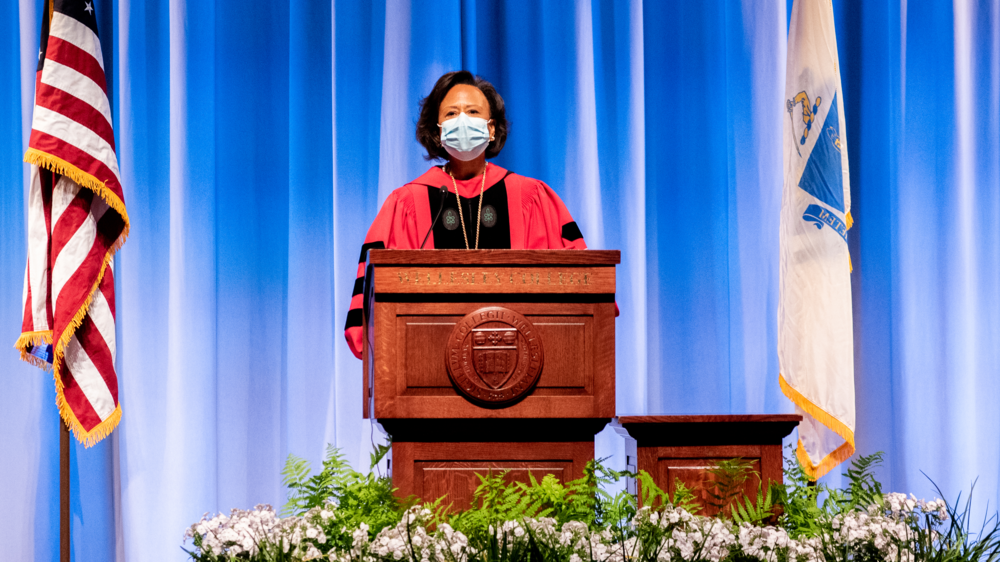2020 Convocation Address

Good afternoon!
Welcome to all of you at the start of this most unusual year—Wellesley’s 146th. Many of you are here on campus. Many others are scattered around the world. Wherever you are, please know this: All of you have an equal place in our community.
A special welcome to the incoming red class of 2024, to our seven new Davis scholars, and to our six new transfer students. We are thrilled to have you among us.
Welcome, too, to our new faculty, and to our new administrative and union members. And a big welcome back to all our returning students:
To the yellow class of 2023.
To the purple class of 2022.
And—last but far from least—to the great green class of 2021.
* * *
Convocation is always an exciting time. The energy is palpable. We revel in our community and everything to come.
All that is true now. But there’s also something more.
The simple fact that we are here today is itself a triumph.
So many have worked tirelessly to bring us to this point—faculty, staff, alumnae, students, and countless friends and allies. You have my gratitude and deepest admiration.
We start this year as a “blended community.” Some of us are remote, and some of us are here on campus. I speak to you today from Alumnae Hall.
While you may not be here physically, you are very much here in spirit.
This is a moment of great loss and challenge. I don’t need to tell you that. At the same time, it has been a time of inspiration and opportunity. It has been a time of innovation. These may be less obvious, but they are no less real.
The Indian writer Arundhati Roy had this to say:
Historically, pandemics have forced humans to break with the past and imagine their world anew. This one is no different. It is a portal, a gateway between one world and the next. We can choose to walk through it, dragging the carcasses of our prejudice and hatred, our avarice, our data banks and dead ideas, our dead rivers and smoky skies behind us. Or we can walk through lightly, with little luggage, ready to imagine another world. And ready to fight for it.
Ready to imagine another world. And ready to fight for it. That is where we are today.
Over the summer, I heard so many inspiring stories about Wellesley students and alumnae. Faced with hardships and disappointments, you found new ways to serve and doubled down on your commitments, in many ways finding purpose through chaos.
Spurred by the continued police violence against Black men and women, millions of people—including many of you—took to the streets to affirm that Black Lives Matter. Just last week, thousands marched on Washington, D.C., while protests raged in Kenosha, Wisconsin, after the tragic shooting of Jacob Blake.
While none of us would support violence, these protests are unprecedented, both in scope and scale, and this year, their spirit will infuse our work toward enhanced diversity, equity and inclusion, and eradication of structural racism and bias on the Wellesley campus.
And just last month, Kamala Harris became the first woman of color—who is Black and South Asian, a daughter of immigrants—on a major party’s presidential ticket. In her acceptance speech, she paid tribute to those who paved the way—to the “[w]omen and men who believed so fiercely in the promise of equality, liberty, and justice for all.”
In all of this, I find so much hope.
Of course, there is darkness. But there is also light. Our job now is to extend that light.
In a wonderful essay collection called The Book of Delights, author Ross Gay poses this compelling question: “What if we joined our sorrows…What if that is joy?”
There is so much wisdom in this. In a time when joy may feel in short supply, we are called on to get creative. To mine our shared humanity for its hidden riches.
Last spring, when everything hung in doubt, I wrote that hope is an action. What I meant is this: To move from hope to reality, we must do the footwork.
Today, I challenge all of us to unite in this effort.
Two words come to mind: flexibility and grace.
So many people are hurting. Now is the time to go that extra mile. To say “I love you” or “thank you.” Let’s commit to doing all we can to champion and support each other. Only together can we become who the world needs us to be.
This year marks the centennial of the 19th Amendment, which removed barriers to voting for some, but not all, women. Black women—and men—would wait decades more, and the job is still unfinished. We are now at grave risk of losing ground.
The U.S. elections take place in just two months and a day from now. If you are eligible to vote, now is the time to be sure you have a plan in place. Now is the time to check with friends to ensure that they have one too.
Last year, I learned that just over half of eligible Wellesley students—52.3 percent—voted in the consequential 2018 midterms. Yes, Wellesley students usually vote in numbers higher than our peers, but we can do better. We must do better. So please, make this a personal mission. Do your part. Get active in the #WellesleyVotes campaign, which you’ll hear more about soon.
* * *
This will be a year unlike any other. But for all the challenges that lie ahead, I could not be more hopeful about the power of our community.
Physical distance is no match for the power of our bonds. Whether we’re six feet or many miles apart, we are ever, always Wellesley.
I know that you will rise to the moment, as you always do.
Together, we can build a better world.
This is what hope looks like.
Thank you.
